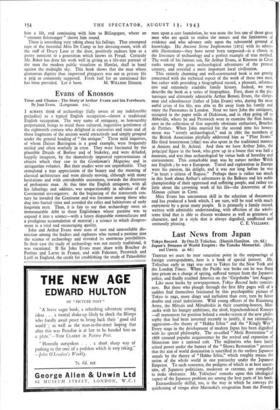Last News from Japan
Tokyo Record. By Otto D. Tolischus. (Hamish Hamilton. I2S. 6d.) Japan's Dreams of World Empire : the Tanaka Memorial. (Allen and Unwin. 4s. 6d.) THOUGH we must be near saturation point in the outpourings of foreign correspondents, here is a book of special interest. Mr. Tolischus early in 1941 was sent to Tokyo for the New York and the London Times. When the Pacific war broke out he was flung into prison on a charge of spying, suffered torture from the Japanese police, and finally reached America on the Gripsholm ' last. August.
Like most books by newspapermen, Tokyo Record lacks concise- ness. But those who plough through the first fifty pages will of a sudden find themselves fascinated by this psychopathic picture of Tokyo in 1941, more dingy and turbulent than ever, torn by fierce doubts and cruel indecisions. Wild young officers of the Kuantung Army, the Mitsuis and Mitsubishis in their counting-houses, Mat- ;uoka with his hungry ambitions, the aloof, hypochondriacal Konoye —all manoeuvre for position behind a smoke-screen of the, new philo- sophy that had been invented recently to justify, if not rationalise, aggression—the theory of " Haldco Ichiu " and the " Kingly Way." Every stage in the development of modern Japan has been dignified with its special philosophy. The so-called " Meiji Restoration " of 1868 ensured popular acquiescence by the revival and expansion of Shintoism into a national cult. The militarists who have lately seized power under the banner of the " Showa Restoration " pretend that the aim of world domination is sanctified in the earliest Japanese annals by the theory of "Hakko Ichiu," which roughly means the union of the whole world in one patriarchy under the Japanese Emperor. To such nonsense, the pedigree of which is at best uncer- tain, all Japanese politicians, moderate or extreme, are compelled to make obeisance. Mr. Tolischus' remarks upon this ideological aspect of the Japanese problem are among the best parts of his book.
Extraordinarily skilful, too, is the way in which he conveys the quickening of tempo after Matsuoka's resignation from the Foreign Office on July 16th, 1941. The assumption of Japanese control over Indo-China was followed by an Anglo-American freezing of Japanese overseas credits—a measure which, the author thinks, but served to exasperate the Japanese. Thereafter it was only a matter of time. He also conveys admirably the sense of the thin membrane dividing Japanese politeness from Japanese brutality. On the eve of their being repatriated, the enemy correspondents are hauled out of the concentration camps and treated to a goodwill lunch. The friendly speeches are hardly finished before the guests are being rough-housed again, just because they refuse to write pro-Japanese articles for the English-language Press, which is still kept alive in the occupied territories of the Far East. I commend this book to all interested in the Pacific struggle.
The authenticity of the Tanaka Memorial " has provoked fatiguing controversy for the last decade and a half. It is difficult to understand why, or the reason for its republication at this moment. Its tedious periods are largely concerned with railway construction in Manchuria ; and as for its notorious passages outlining Japanese dreams of world- conquest, they are drawing-room reading compared with some of the latest pamphlets issued by the Tokyo Ministry of























 Previous page
Previous page